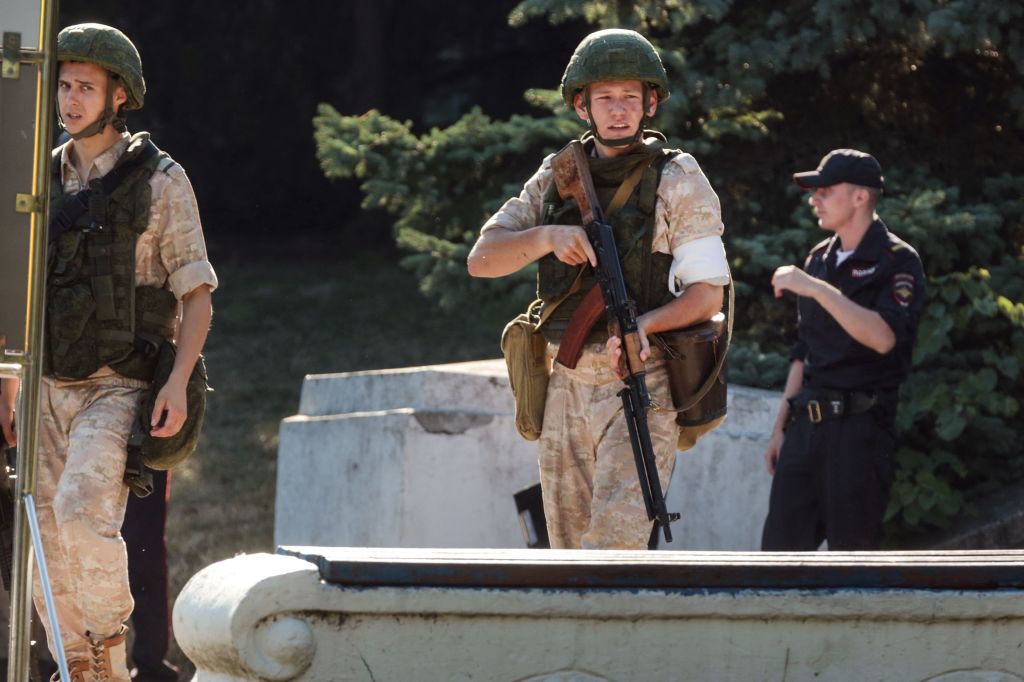Russia is hunting pro-Ukraine saboteurs after humiliating Crimea explosions


A free daily email with the biggest news stories of the day – and the best features from TheWeek.com
You are now subscribed
Your newsletter sign-up was successful
Russian intelligence services are hunting for saboteurs in occupied Crimea after a series of explosions over the past week destroyed Russian munition depots, air bases, warplanes, and infrastructure used to supply Russian troops invading Ukraine, The Wall Street Journal reported Wednesday. Russia and Ukrainian officials agree that saboteurs were responsible for Tuesday's massive explosions at an ammunition site near the town of Dzhankoi.
Ukraine is not officially acknowledging any role in the Crimea blasts, but some officials have said Ukrainian special operations forces and guerrilla allies are responsible for the explosions near Dzhankoi, at Saki airbase, and at a military airfield in Gvardeyskoye. Russia's FSB intelligence agency said Wednesday it has detained six Russian citizens in Crimea who belonged to a terrorist cell that worked with Ukrainian "emissaries," the Journal says.
Russia has "become increasingly invested in framing recent Ukrainian strikes on Russian military assets in Crimea as acts of terrorism," baselessly pointing to the Islamist group Hizb ut-Tahrir, the U.S.-based Institute for the Study of War think tank said Wednesday. But Ukraine set up a secret network of resistance fighters before Russia's invasion, The New York Times reports. "Slipping back and forth across the front lines, the guerrilla fighters are known in Ukraine as partisans, and in recent weeks they have taken an ever more prominent role in the war, rattling Russian forces by helping deliver humiliating blows in occupied areas they thought were safe," notably in Crimea.
The Week
Escape your echo chamber. Get the facts behind the news, plus analysis from multiple perspectives.

Sign up for The Week's Free Newsletters
From our morning news briefing to a weekly Good News Newsletter, get the best of The Week delivered directly to your inbox.
From our morning news briefing to a weekly Good News Newsletter, get the best of The Week delivered directly to your inbox.
"The goal is to show the occupiers that they are not at home, that they should not settle in, that they should not sleep comfortably," a partisan code-named Svarog told the Times.
In fact, "Russian military leadership is likely increasingly losing confidence in the security of Crimea following recent Ukrainian strikes," ISW assessed, noting that the Kremlin quietly replaced Admiral Igor Osipov, commander of the Crimea-based Black Sea Fleet, with Vice Admiral Viktor Sokolov. Ukrainian intelligence also said Wednesday that Russia is moving dozens of Crimea-based warplanes and helicopters back to Russian territory or deeper into Crimea.
The U.S., for its part, supports Ukraine's attacks on Crimea, Politico reported Wednesday. "We don't select targets, of course, and everything we've provided is for self-defense purposes," a senior Biden administration official told Politico "Any target they choose to pursue on sovereign Ukrainian soil is by definition self defense," and "Crimea is Ukraine."
A free daily email with the biggest news stories of the day – and the best features from TheWeek.com
Peter has worked as a news and culture writer and editor at The Week since the site's launch in 2008. He covers politics, world affairs, religion and cultural currents. His journalism career began as a copy editor at a financial newswire and has included editorial positions at The New York Times Magazine, Facts on File, and Oregon State University.
-
 Health insurance: Premiums soar as ACA subsidies end
Health insurance: Premiums soar as ACA subsidies endFeature 1.4 million people have dropped coverage
-
 Anthropic: AI triggers the ‘SaaSpocalypse’
Anthropic: AI triggers the ‘SaaSpocalypse’Feature A grim reaper for software services?
-
 NIH director Bhattacharya tapped as acting CDC head
NIH director Bhattacharya tapped as acting CDC headSpeed Read Jay Bhattacharya, a critic of the CDC’s Covid-19 response, will now lead the Centers for Disease Control and Prevention
-
 The mission to demine Ukraine
The mission to demine UkraineThe Explainer An estimated quarter of the nation – an area the size of England – is contaminated with landmines and unexploded shells from the war
-
 The secret lives of Russian saboteurs
The secret lives of Russian saboteursUnder The Radar Moscow is recruiting criminal agents to sow chaos and fear among its enemies
-
 Is the 'coalition of the willing' going to work?
Is the 'coalition of the willing' going to work?Today's Big Question PM's proposal for UK/French-led peacekeeping force in Ukraine provokes 'hostility' in Moscow and 'derision' in Washington
-
 Ukraine: where do Trump's loyalties really lie?
Ukraine: where do Trump's loyalties really lie?Today's Big Question 'Extraordinary pivot' by US president – driven by personal, ideological and strategic factors – has 'upended decades of hawkish foreign policy toward Russia'
-
 What will Trump-Putin Ukraine peace deal look like?
What will Trump-Putin Ukraine peace deal look like?Today's Big Question US president 'blindsides' European and UK leaders, indicating Ukraine must concede seized territory and forget about Nato membership
-
 Ukraine's disappearing army
Ukraine's disappearing armyUnder the Radar Every day unwilling conscripts and disillusioned veterans are fleeing the front
-
 Cuba's mercenaries fighting against Ukraine
Cuba's mercenaries fighting against UkraineThe Explainer Young men lured by high salaries and Russian citizenship to enlist for a year are now trapped on front lines of war indefinitely
-
 Ukraine-Russia: are both sides readying for nuclear war?
Ukraine-Russia: are both sides readying for nuclear war?Today's Big Question Putin changes doctrine to lower threshold for atomic weapons after Ukraine strikes with Western missiles
